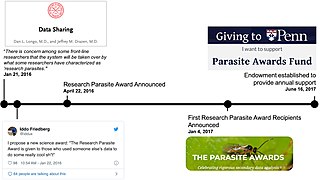This article may rely excessively on sources too closely associated with the subject, potentially preventing the article from being verifiable and neutral. (January 2020) |
| The Research Parasite Award | |
|---|---|
| Awarded for | Outstanding contributions to the rigorous secondary analysis of data |
| Hosted by | Endowment housed at the University of Pennsylvania |
| First awarded | 2017 |
| Website | https://researchparasite.com/ |
The Research Parasite Award is an honor given annually at the Pacific Symposium on Biocomputing to recognize scientists who study previously published data in ways not anticipated by the researchers who first generated it. The tongue-in-cheek name of the award refers to a New England Journal of Medicine editorial[1] that coined the term "research parasite" to disparage such work.[2][3] The idea was first suggested on Twitter by Iowa State University researcher Iddo Friedberg shortly after the editorial was published,[4] and was then brought to life by Casey Greene, a pharmacologist at the University of Pennsylvania.[5]
Two Research Parasite Awards are given to recognize scientists who have made outstanding and rigorous contributions to analysis of secondary data in biology. Recipients must reuse data generated by someone else to extend, replicate, or disprove a research study in a reproducible manner. The junior parasite award recognizes an outstanding contribution from an early career scientist such as a postdoctoral, graduate, or undergraduate trainee. The senior parasitism award recognizes an individual who has engaged in exemplary research parasitism for a sustained period of time. Since the launch of the award in 2017,[6] a travel grant to attend the Pacific Symposium on Biocomputing has been provided to the junior parasite award winner by GigaScience.[7] Starting for the 2019 award year the awards are supported in part by an endowment housed at the University of Pennsylvania.

The Research Symbiont Awards, inspired by the Research Parasite Award, was founded by J. Brian Byrd, a physician-scientist at the University of Michigan.[8] Recognizing exemplars in the practice of data sharing, they are given to scientists working in any area of study who have shared data beyond the expectations of their field.[9] Unlike a parasite, naming the data sharing award after symbionts helps stress that this process can be mutually beneficial to the data producing "host" because it increases the scientific impact of their investigators. From 2021 the award has been sponsored by the Wellcome Trust and Dragon Master Foundation. The 2021 winners of the General Symbionts prize were Zhang Yongzhen and Edward C. Holmes for their sharing of the sequence of the first SARSCov2 genome.[10]
- ^ Longo DL, Drazen JM (January 2016). "Data Sharing". The New England Journal of Medicine. 374 (3): 276–7. doi:10.1056/NEJMe1516564. PMID 26789876.
- ^ Greene CS, Garmire LX, Gilbert JA, Ritchie MD, Hunter LE (March 2017). "Celebrating parasites". Nature Genetics. 49 (4): 483–484. doi:10.1038/ng.3830. PMC 5710834. PMID 28358134.
- ^ Park Y, Greene CS (November 2018). "A parasite's perspective on data sharing". GigaScience. 7 (11): giy129. doi:10.1093/gigascience/giy129. PMC 6258825. PMID 30395209.
- ^ Friedberg I (2016-01-22). "I propose a new science award: "The Research Parasite Award is given to those who used someone else's data to do some really cool sh*t"". @iddux. Retrieved 2020-01-06.
- ^ Cite error: The named reference
sn1was invoked but never defined (see the help page). - ^ Altman RB, Dunker K, Hunter A, Ritchie L, Murray T, Klein TE (2016-11-22), Altman RB, Dunker AK, Hunter L, Ritchie MD (eds.), "Preface: Pacific Symposium on Biocomputing 2017", Biocomputing 2017, World Scientific, p. vii, doi:10.1142/9789813207813_fmatter, ISBN 978-981-320-780-6
- ^ Duvallet C (January 2020). "Data detectives, self-love, and humility: a research parasite's perspective". GigaScience. 9 (1). doi:10.1093/gigascience/giz148. PMC 6940423. PMID 31897481.
- ^ "The Research Symbiont Awards". researchsymbionts.org. Retrieved 2020-01-11.
- ^ Community Data Science Collective (2019-01-07). "Benjamin Mako Hill is a Research Symbiont!". Community Data Science Collective. Retrieved 2020-01-11.
- ^ "The Research Symbiont Awards". researchsymbionts.org. Retrieved 2021-05-01.